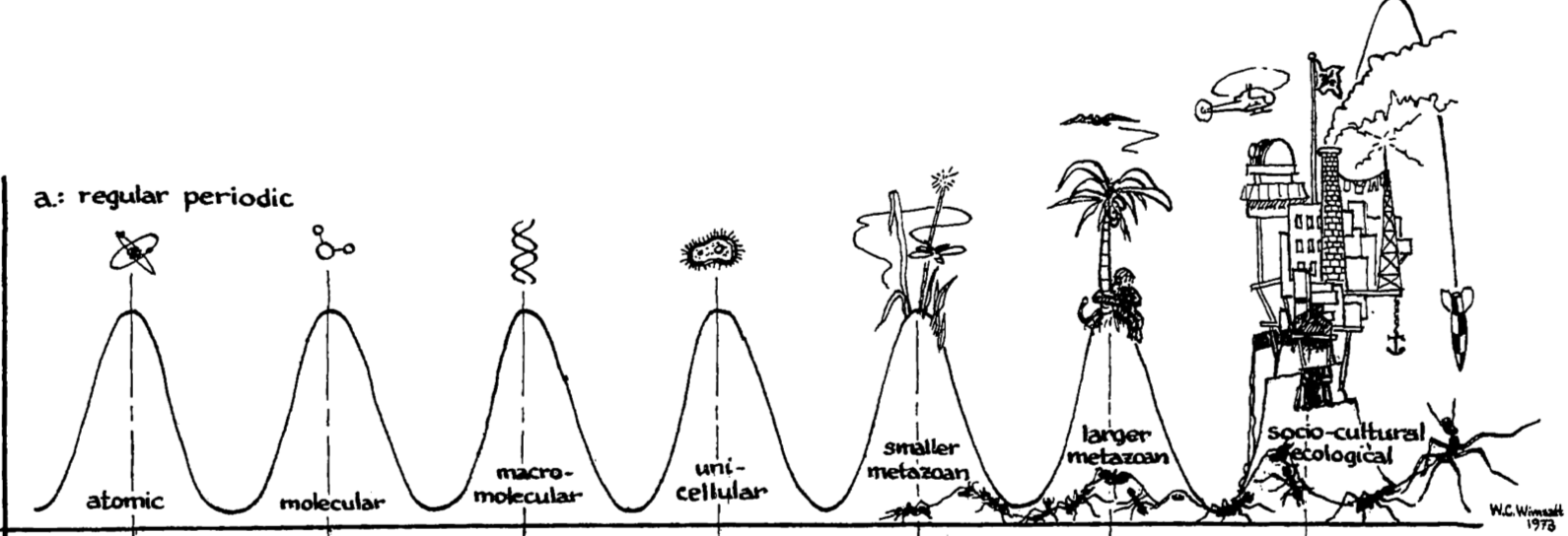Research
Levels of organization minimally constitute loci within the phase space of generative processes sorting the formation of physical matter into unique forms. These loci exhibit clustered peaking when plotted against scale-relative forces such that (i) more regularities concerning forms of matter are captured within than in between these clusters, and (ii) matter's behavior becomes more predictable when plotted as such.
D.S. Brooks (under review), after W.C. Wimsatt
Levels of Organization
My primary research focus concerns a systematic investigation of the concept of levels of organization in biological science. Though the concept of levels has long been a major element within life science thinking, there is little consensus surrounding basic questions posed of the notion, including the nature of levels, the significance of the concept, and its history. I seek in my research to address each of these using resources garnered from scientific philosophy, history of science, and theoretical biology. This research has been funded by a grant generously provided by the German Research Foundation (DFG).
The results of this research will appear in a monograph tentatively titled The Leveled World: The Role of Levels of Organization in Biological Thought.
This section provides an overview of the work I have contributed to the literature on the levels concept.
-
Given the wide presence of reference to the notion of levels in biological science, it is critical to structure the contributions of the levels concept in terms of the characteristic usage profiles associated with the notion. In this regard, I have claimed that the levels concept is sensitive to usage dynamics connected to the embedding theoretical frameworks in which the concept appears. This feature of the levels concept frequently leads to its meaning and purported usefulness to be coopted by that framework, effectively bypassing any substantive engagement with what (if any) contributions are elicited by the concept itself.
Moreover, I have explored broader usage patterns associated with the levels concept, which point to two characteristic profiles in the biological literature. These profiles point to (1) its usage as a conceptual tool to couch findings and insights into an experimental system within putatively level-bound units, and (2) its usage as an overarching ‘doctrine’ of biology, not unlike cell theory or the germ theory of disease, which provides impetus for research-structuring efforts in the form of e.g. grant initiatives.
-
Accompanying the character of the concept’s usage in biological literature, the significances exhibited by, or attributed to, the notion of levels requires scrutiny. Here I have provided input on several facets to these issues.
In a 2018 paper coauthored with Markus I. Eronen, Eronen and I propose a rapprochement between so-called “levels skeptics” and advocates of the levels concept by establishing that the levels concept should be seen in terms of the approximative value that its descriptions of natural phenomenon, perched in research-structuring and organizing capacities.
I later followed up on this heuristic appraisal by postulating a motivating rationale that guides the concept’s usage in scientific contexts — i.e. the concept’s capacity to structure scientific problems. This generic “epistemic goal” of the concept enables casting the analysis of levels of organization in a different light than in terms of problematic expectations of the concept in the wider literature. To wit: it enables substantiating the commitments and assumptions associated with empirical uses of the concept in light of the structure it imparts to scientific problems.
-
I am currently involved in several follow ups to my established work and am looking to break new ground on the nature of levels of organization.
One project is focusing on the disarray surrounding the levels concept in the philosophy of science and biological literature. The widespread use of the concept, coupled with a relative lack of attention to the concept’s nature and significances have threatened to make the concept all but meaningless and replaceable with other notions such as composition and scale. This, I believe, deeply mistakes what is at stake with the levels concept and what the concept contributes to biological research.
Another project seeks to follow up on the rapprochement with Eronen to engage in the systematic upshots that the levels concept’s heuristic uses can offer to a more substantive, and ontological, understanding of the concept.
Finally, in a paper currently under review, I document and analyze the concept’s injection into the scientific textbook literature, and how these pioneering uses established important usage patterns of the concept in biological thinking. Ultimately, I wish to argue, the issues evoked by the concept’s introductory tone resonate with later professional uses of the term.
History and Philosophy of Biology
I also maintain active research efforts in the history of neuroscience (particularly the history of theoretical neuroscience and the brain-computer metaphor), ‘Cambridge’ organicism, and non-fundamental causation. Additionally, I am conducting research into neurophilosophy (particularly eliminative materialism), and methods in natural philosophy.
-
I am interested in the construction of research programs in different areas of neuroscience, and constructing more fine-grained accounts of what counts as scientific progress in local scientific communities. Focusing on my expertise in invertebrate neurobiology, I contend that constructing research programs in neuroscientific research is broadly erotetic in nature: That is, they deal to a large extent with the formation of questions that guide the field, rather than confirm theories as is assumed in classical philosophical literature.
-
-
In recent years, a heated debate has emerged concerning the usefulness of the interventionist account of causation for providing a means of articulating causal claims in the special sciences, thereby vindicating non-reductive causality. The focus of this debate has been whether interventionism contains the resources with which to deal with the causal exclusion problem. Though interventionist arguments that have been offered for non-reductive causal claims, progress has been blunted by a number of reductionist responses utilizing novel exclusionist arguments from within the interventionist framework itself.
My approach to this discussion is to focus on the role of methodology as a significant determiner for the dynamics of philosophical debate: At the core of this discussion there is a palpable tension that has not been adequately acknowledged by its participants. This tension is centered on the prospects of engaging a primarily metaphysical problem (causal exclusion) with an epistemological framework (interventionism). Acknowledging this underlying tension motivates searching for a new perspective for treating the dispute between metaphysically-based causal exclusion worries and “evidence-based” approaches to defending nonfundamental causation.
This is a talk I gave on levels at the Institute for Cultural Inquiry, based in Berlin, in November 2024. The title of the talk is “Scale Ranges, The Variety of Matter’s Forms, and Levels of Organization as Local Maxima.”
See more at (including pictures and Q&A):
Below is a old (2017) video created by Greg Boyle for the Konrad Lorenz Institute for Evolution and Cognition Research to showcase my research efforts on the concept of levels of organization.


